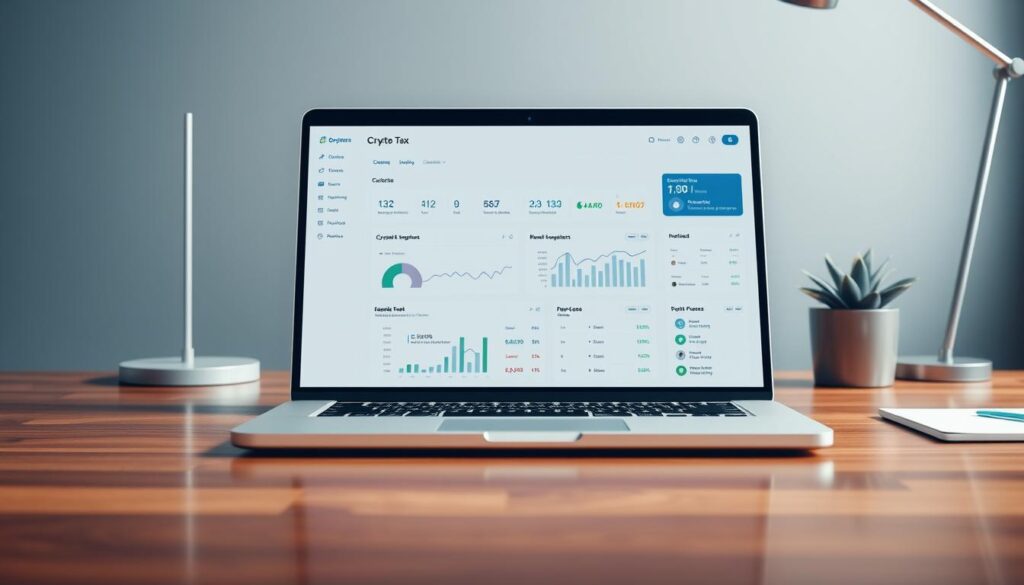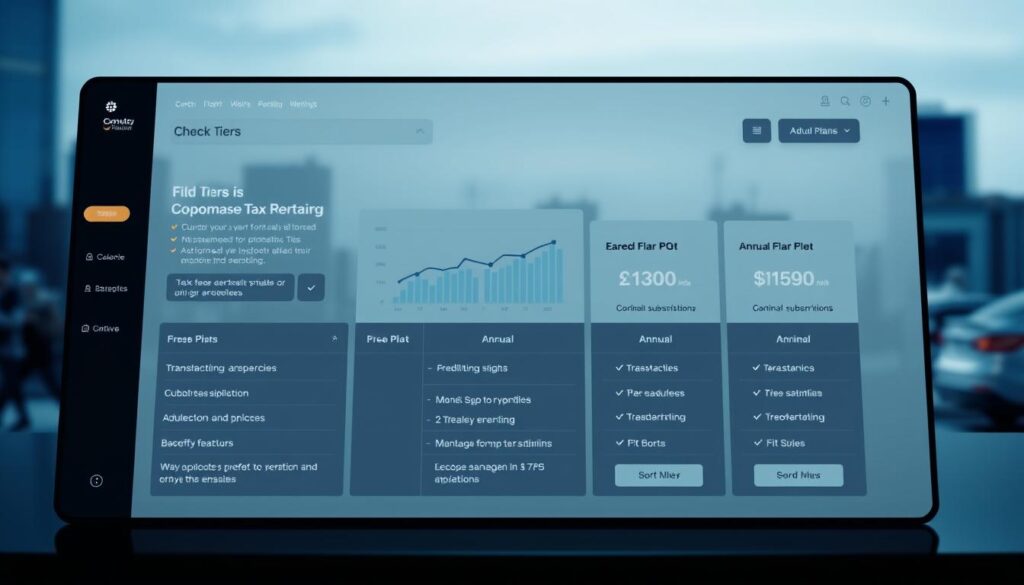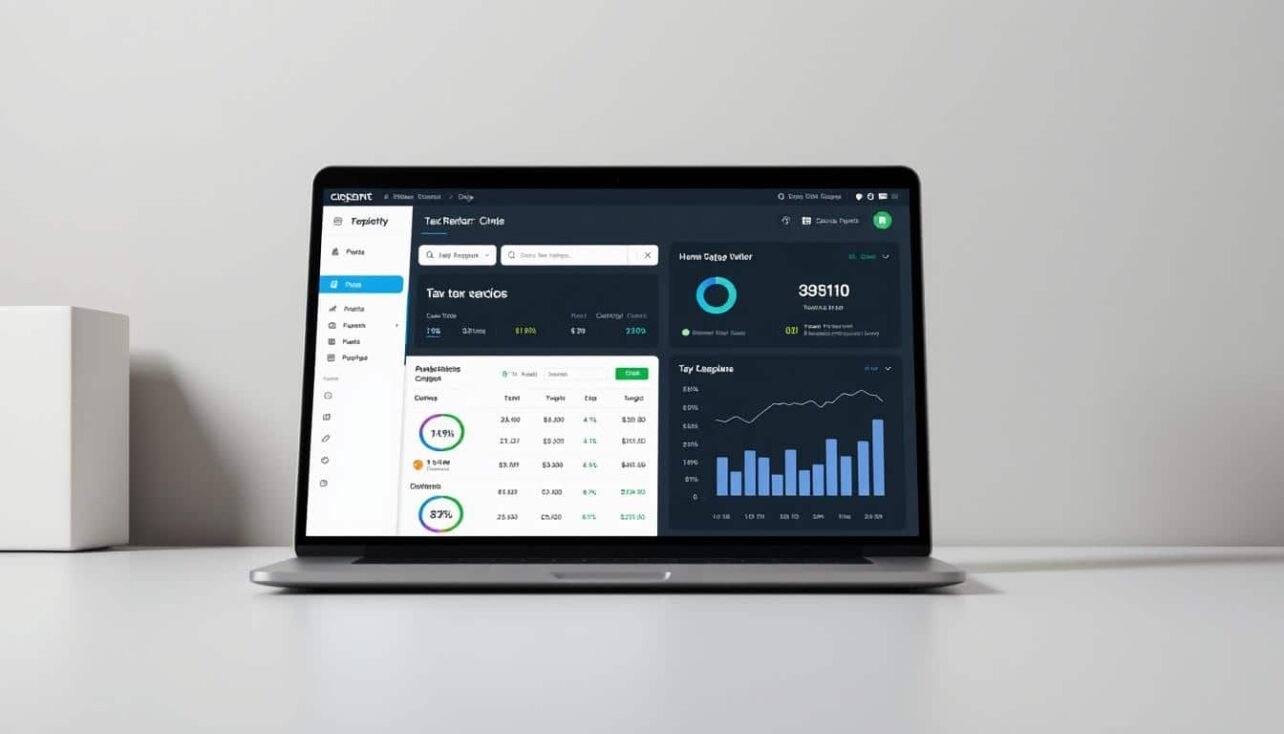This product roundup helps US users pick the best crypto tax software to save time and cut filing errors.
We focus on accuracy, integrations, and real-world filing steps. The review highlights Koinly, CoinLedger, and CoinTracking and explains when simple calculators suffice for a few trades.
Expect clear guidance on exports to TurboTax, including Form 8949 and Schedule D where available. We note plan pricing per year, transaction caps, and which platforms support CPA workflows with exportable data.
Readers will learn which tools match small portfolios, active traders, or accountants. We flag feature limits and practical steps so you can verify each website’s claims before you file.
Short, actionable advice is the goal: match needs to features, confirm exchange compatibility, and consult a CPA when in doubt.
What buyers need right now: how to choose crypto tax software in the present market
Start with accuracy. Confirm a platform calculates short- and long-term gains, supports IRS forms like 8949 and Schedule D, and handles high-frequency transactions without errors.
Next, weigh transaction limits and annual cost. Most plans cap transactions, so match the plan to your activity across exchanges and wallets for the current year.

Essential features to check
Look for DeFi, NFT, staking, margin/futures coverage and tax loss harvesting. These features matter if you use protocols or NFT marketplaces.
Data intake and export
Prefer strong API syncs, reliable CSV uploads, and one-click exports to TurboTax, H&R Block, TaxAct, or TaxSlayer. Verify that CPA workflows and exportable forms are available.
Security and transparency
Choose tools with clear pricing, defined free limits, read-only API support, and downloadable audit logs. Good support docs and step-by-step exchange guides speed setup and reduce errors.
| Decision Factor | What to verify | Why it matters |
|---|---|---|
| Accuracy | Forms 8949/Schedule D, gain calc | Prevents costly amendments and audits |
| Transactions & price | Plan caps, annual cost | Ensures the plan fits your volume and budget |
| Features & data | DeFi/NFT support, API/CSV, exports | Saves time and keeps records portable |
| Support & security | CPA exports, docs, API key handling | Reduces setup risk and improves audit readiness |
Cryptocurrency tax reporting software comparison
Compare each platform’s speed, export options, and specialty features to pick the best fit.

Koinly
Fast syncing and IRS-ready outputs like Form 8949 and Schedule D. Plans run roughly $49–$400 per year. The free tier shows results but won’t produce downloadable forms.
CoinLedger
Guided workflow: Import, Classify, Review, Tax Reports. Pricing sits around $49–$299 and it integrates with TurboTax and other filing partners for smoother imports.
CoinTracking
Good for portfolio tracking and deep analytics. Around $156 per year, supports NFT/custom prices, and is popular with accountants who need extensive dashboards.
Other notable options
- TaxBit: Enterprise-first, API-focused for platforms.
- CoinTracker: 500+ integrations, mobile apps, tax loss harvesting ($59–$599 tiers).
- TokenTax: From $65; cheapest plan limits you to Coinbase unless you upgrade.
- ZenLedger / CoinPanda / Awaken: Ranges for DeFi/NFT support and higher-tier power users.
- Crypto.com Tax & Bitcoin.Tax: Free or legacy options with feature trade-offs.
| Platform | Price (per year) | Key strength | Notes |
|---|---|---|---|
| Koinly | $49–$400 | Fast sync, IRS-ready reports | Free view-only tier |
| CoinLedger | $49–$299 | Guided workflow, TurboTax | Good for beginner filers |
| CoinTracking | ~$156 | Portfolio tracking, CPA tools | Deep analytics, NFT support |
| CoinTracker | $59–$599 | Wide integrations, mobile apps | Tax loss harvesting, Coinbase partner |
Best picks by use case: the right crypto tax tool for your situation
Select a platform by matching your activity, the exchanges and wallets you use, and the level of reporting you need this year. Focus on setup speed, integrations, and whether you need deep portfolio tracking or simple form generation.

Best overall: Koinly
Koinly is ideal if you want a straightforward setup, fast syncing, and quick generation of Form 8949 and Schedule D without extra portfolio bells.
Best for pain-free filing and bookkeeping: CoinLedger
CoinLedger uses a clear four-step workflow and integrates with TurboTax to simplify the last mile of filing for the current year.
Best for deep portfolio tracking: CoinTracking
CoinTracking suits users who want dashboards, charts, and detailed accounting alongside tax features that CPAs appreciate.
Best for DeFi/NFT heavy activity
ZenLedger and CoinTracker handle on-chain complexity, NFT tooling, and tax loss harvesting for complex gains scenarios.
Other fits
- Crypto.com Tax: a free starter option with limited features for light users.
- Blockpit: focused on EU/UK users and niche exchanges after acquiring Accointing.
- TaxBit: enterprise-grade compliance and API-driven workflows for platforms and institutions.
| Use case | Top pick | Why |
|---|---|---|
| Simple, fast forms | Koinly | Quick sync, easy exports |
| Pain-free filing | CoinLedger | Guided flow & TurboTax |
| Deep tracking & CPA work | CoinTracking | Dashboards and detailed reports |
| DeFi/NFT heavy | ZenLedger / CoinTracker | Broader on-chain support |
Quick tip: weigh the exchanges and wallets you use, the number of transactions per year, and whether you need CPA collaboration before you pick a platform.
Pricing and plan structures: free versions, per-year costs, and transaction tiers
Pricing usually scales with activity. Match your expected transactions to plan tiers so you avoid mid-year upgrades. Focus on the per year cost and which features are included at each level.

Entry-level to mid-tier
Most casual to active users fit plans that price by transactions. Koinly runs $49–$400 per year. CoinLedger sits at $49–$299 per year. CoinTracker covers $59–$199 per year for common volumes.
Advanced and unlimited tiers
Power users can move to higher tiers. CoinTracker Advanced is $599. ZenLedger has limits up to $999, and Awaken reaches about $600 per year for larger loads.
Free or freemium options and caveats
Free plans help with imports but often limit exports. Koinly’s free view does not allow form downloads. CoinPanda and Crypto.com Tax offer basic, no-cost options with trade-offs.
High-volume traders and accountants
CoinTracking provides tiered plans up to unlimited and enterprise licensing for multi-client accounting. TokenTax starts at $65, but plans that cover all exchanges jump to about $199 per year.
| Plan tier | Representative price (per year) | Best for |
|---|---|---|
| Entry / mid | $49–$199 | Casual to active users |
| Advanced | $199–$599 | High-frequency traders, NFT users |
| Premium / unlimited | $600–$999 | Accountants, enterprise |
Integrations, imports, and reports: make filing easy across wallets and exchanges
Start by confirming each platform can pull data directly from your favorite exchanges and wallets. Good feeds cut manual edits and help you avoid mismatched cost basis across accounts.
Tax filing partners and exports
Look for native exports to TurboTax, H&R Block, TaxAct, and TaxSlayer. Koinly connects with TurboTax, H&R Block, and TaxAct. CoinLedger supports TurboTax, TaxAct, TaxSlayer, and H&R Block. CoinTracking, CoinTracker, and ZenLedger all offer TurboTax integration.
Exchange and wallet coverage
Coverage varies: CoinTracker lists 500+ exchanges and wallets while CoinPanda claims 800+.
Confirm that your specific exchanges and wallets are supported with API syncs or reliable CSV templates before you buy a plan.
Report outputs and accounting methods
Ensure tools produce IRS-ready outputs like Form 8949, Schedule D, and the 1040 lines for income events.
Also verify support for FIFO, LIFO, HIFO, ACB, and SpecID—method choice can change owed amounts in volatile years.
- Prefer platforms with deduplication and price-history backfill to close data gaps.
- Choose tools that package transaction logs and cost-basis details for accountant review.
- If an integration is missing, use CSV templates and historical pricing to fill holes.
| Need | What to check | Example platforms |
|---|---|---|
| Filing partner | Native TurboTax/CSV export | Koinly, CoinLedger, CoinTracking |
| Exchange coverage | API syncs, 500–800+ integrations | CoinTracker, CoinPanda |
| Accounting methods | FIFO / LIFO / HIFO / ACB / SpecID | Most major platforms |
For more on picking tools that match your needs, see our guide to the best tax software for cryptocurrency in the United States.
Feature depth: portfolio tracking, DeFi/NFT handling, and tax optimization
A platform’s feature map determines whether you can monitor holdings and handle complex on-chain events in one place. Robust portfolio tracking ties balances, realized and unrealized gains, and cost basis into interactive dashboards.
Mobile apps help users review classification flags and resolve issues on the go. CoinTracker offers mobile apps and built-in loss harvesting. CoinTracking provides deep dashboards for traders and accountants.
DeFi support must cover swaps, liquidity pool entries/exits, staking rewards, and bridge events. ZenLedger and similar platforms map NFT sales and staking income so income entries appear correctly on forms.
NFT tooling—like OpenSea partnerships or dedicated NFT centers—speeds categorization for large collections and captures marketplace fees and metadata for accurate cost basis.
Look for loss-harvesting recommendations and clear short vs long-term gains separation. Good platforms surface harvest opportunities before year-end and let users reconcile transactions across wallets and exchanges.
- Dashboards: drill into transactions to fix misclassifications.
- DeFi/NFT mapping: normalize contract events to reduce manual edits.
- Balance cost vs features: pick depth only if you use on-chain services heavily.
| Feature | Why it matters | Example |
|---|---|---|
| Mobile tracking | Quick review and fixes | CoinTracker |
| DeFi/NFT mapping | Accurate cost basis on complex trades | ZenLedger |
| Portfolio dashboards | Reconcile and plan trades | CoinTracking |
Trust, ratings, and expert guidance
Trust and real-world feedback help you judge which platform will handle your season of filings with fewer surprises. Look beyond star averages and read for patterns about accuracy, support responsiveness, and how vendors handle disputes.
Trustpilot snapshot and interpreting user reviews (June 2024)
Use Trustpilot scores as a starting point. Check recent reviews for repeated notes on accuracy, refund policies, and support speed. A few negative outliers mean less than a steady trend of complaints about the same issue.
Accountant workflows and CPA-ready exports
Prioritize platforms that package exportable transaction logs, cost-basis details, and final reports for accountant review. All major platforms listed (Koinly, CoinLedger, CoinTracking, TaxBit, CoinTracker, TokenTax, ZenLedger, CoinPanda, Bitcoin.Tax, Blockpit) support CPA workflows with downloadable files that reduce turnaround time.
Expert advice: verify claims and consult a CPA
Before you buy, ask support about your exact exchanges and wallets. The clarity and speed of their reply reveals real support quality.
Consult a CPA for complex scenarios—DeFi, NFT royalties, or cross-border issues—and keep records of correspondence and final reports if an audit happens.
| What to review | Why it matters | Action |
|---|---|---|
| Trustpilot trends | Shows recurring strengths/weaknesses | Read recent reviews, focus on accuracy & support |
| Exportability for accountants | Reduces review time and errors | Confirm CSV/Excel, Form 8949-compatible exports, and packaged reports |
| Documentation & changelogs | Speeds onboarding and fixes | Check website help center, videos, and update notes |
| Free version limits | May block final report downloads | Test free tier to confirm it meets your filing needs |
Who should use which platform? Recommendations by user profile
Not every platform fits every user. Decide by volume, account spread, and whether you need audit trails or just fast form exports.
Casual users with few transactions
If you only have a handful of trades, start with free calculators or a basic plan for the USA, Canada, UK, or Australia.
Why: You avoid paying for extra features you won’t use while still getting accurate forms and simple exports.
Active traders across multiple exchanges and wallets
Prioritize integrations and import speed. Tools like CoinTracker (500+ integrations) or CoinPanda (800+ integrations) reduce manual CSV work and save time.
Why: Faster imports and better auto-classification lower cleanup time and cut errors on high-volume accounts.
Businesses and high-stakes filers
Choose enterprise-grade platforms such as TaxBit for compliance workflows or CoinTracking for high transaction limits and licensing options.
Why: Look for role-based access, audit trails, exportable accounting files, and clear SLA-style support before you buy.
- Weigh price versus time: faster imports can be worth a higher subscription.
- Confirm DeFi/NFT and multi-country coverage at your plan level.
- Re-evaluate annually as your activity and reporting needs change.
| User profile | Top pick | Why |
|---|---|---|
| Casual / few trades | Crypto.com Tax / free options | Low cost, basic exports for simple filings |
| Active multi-exchange trader | CoinTracker / CoinPanda | Hundreds of integrations, fast sync |
| Business / enterprise | TaxBit / CoinTracking | Compliance workflows, high limits, audit features |
Conclusion
Aim for a solution that balances accuracy, integrations, and support so you avoid last-minute surprises.,
Pick a tool that converts trades into clean exports for TurboTax and produces Form 8949, Schedule D, and income lines with minimal edits. Koinly and CoinLedger deliver fast, IRS-ready flows, while CoinTracking and CoinTracker add deep tracking, dashboards, and loss-harvesting that help manage capital gains and losses.
Check integrations with your exchanges and wallets, review total cost beyond the sticker price, and confirm NFT and DeFi handling if you use on-chain services. TokenTax, Crypto.com Tax, Blockpit, and TaxBit fill niche and enterprise needs.
Do a short pilot and have a CPA review final files. That step saves time and protects your position as the market and rules change.
FAQ
What should I look for when choosing crypto tax software right now?
Look for accuracy and clear capital gains methods (FIFO, HIFO, specific ID), reasonable transaction limits per year, and transparent pricing. Confirm support for DeFi, NFTs, staking, and margin/futures if you use those products. Also check API syncs and CSV import options so you can pull data from exchanges and wallets quickly.
Which platforms generate IRS-ready forms like Form 8949 and Schedule D?
Many major tools — including Koinly, CoinLedger, CoinTracker, and TokenTax — produce Form 8949 and Schedule D exports. TaxBit and CoinTracking also offer detailed IRS-ready reports for businesses and high-volume users. Always verify the specific form outputs before you subscribe.
How do I connect exchanges and wallets to a tax tool?
Most providers support API syncs for exchanges like Coinbase, Binance, Kraken, and wallets via public addresses. You can also upload CSVs from exchanges or use portfolio imports. Check for coverage of niche platforms if you trade on less common venues.
Are there free options suitable for beginners?
Yes. Crypto.com Tax and basic tiers from CoinPanda or ZenLedger provide free or freemium plans with limited transactions. These work for casual users with few trades but may lack DeFi/NFT handling and advanced reports.
Which tools handle DeFi and NFT activity well?
ZenLedger and CoinTracker have strong DeFi and NFT support, including tracking of staking and marketplace activity. Koinly also covers many DeFi protocols. If you use complex smart contracts or NFT marketplaces, verify specific protocol coverage first.
How do tax loss harvesting tools work in these platforms?
Platforms with tax loss harvesting identify opportunities to sell losing positions and rebuy similar assets to realize losses within tax rules. CoinTracker and Koinly offer harvesting workflows. Remember to follow wash sale guidance and consult a professional for complex strategies.
Can these services export to TurboTax or H&R Block?
Yes. Many services provide direct exports compatible with TurboTax, H&R Block, TaxAct, and TaxSlayer. CoinLedger and CoinTracker advertise smooth TurboTax integration. Always test an export to ensure fields map correctly before filing.
What pricing ranges should I expect per year?
Entry plans often range from about to 9 yearly for typical users. Mid and high tiers can go up to several hundred dollars; CoinTracker and ZenLedger have premium plans near 9–9 for high-volume traders. Enterprise and accounting licenses cost more and offer unlimited transaction support.
Which platform is best for accountants and businesses?
TaxBit and CoinTracking cater to enterprise needs with audit trails, multi-user workflows, and compliance features. CoinLedger and CoinTracker also provide accountant tools and export formats designed for CPA review.
How important is country coverage and compliance?
Very important. Confirm the tool supports your country’s reporting rules and produces local forms if needed. Some tools focus on the U.S. with Form 8949 and Schedule D, while others offer broader international support and currency handling.
What security and privacy features should I check?
Look for two-factor authentication, read-only API keys (no withdrawal access), encrypted storage, and clear privacy policies. Verify pricing transparency and limits on free versions to avoid surprises during filing season.
How do I handle airdrops, forks, and crypto income in these tools?
Most modern platforms let you tag income events like airdrops, mining rewards, and forks separately from capital gains. They calculate ordinary income where appropriate and include those entries on income worksheets or exportable forms for your accountant.
Can I import historical trades from legacy platforms?
Yes, via CSV upload, API sync (if supported), or broker/exchange statements. CoinPanda and CoinTracking advertise broad legacy import options and manual mapping tools to reconcile mismatched records.
What if I receive an audit notice related to crypto activity?
Choose a provider with audit-ready reports and clear transaction provenance. Exportable transaction histories, cost basis calculations, and exchange statements help. Consider upgrading to a plan with CPA support and consult a tax professional immediately.
How often should I sync or update my portfolio during the year?
Sync often — monthly or quarterly is a good practice for active traders. Regular updates reduce reconciliation work at year-end and help you spot tax-loss harvesting opportunities and unexpected income events.
Do platforms calculate short-term vs. long-term gains automatically?
Yes. Tools apply holding-period rules automatically and separate short-term and long-term gains on reports. Verify the chosen cost-basis method (FIFO, HIFO, Specific ID) aligns with your preferred accounting approach before finalizing reports.


No comments yet